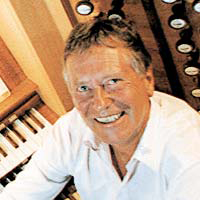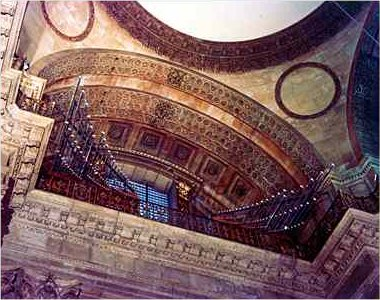Christopher Dearnley
startler of Royalty !

Christopher Dearnley, who has died in Australia aged 70, served the cause of cathedral music
in two hemispheres with great distinction for half a century. As organist and director of
music at St Paul's cathedral from 1968-90, he masterminded the music for many state occasions:
the thanksgiving service for the Queen's silver jubilee in 1977, the wedding of the Prince and
Princess of Wales in 1981 and the Falklands war thanksgiving service in 1982.
Born in Wolverhampton, the third son of an Anglican clergyman, Dearnley was educated at
Cranleigh school and Worcester College, Oxford, where he held an organ scholarship from 1948-
52. He read theology jointly with music for his BA degree and, in his fourth year, took the
degree of B Mus.
This academic grounding stood him in good stead. He produced two books: The Treasury Of
English Church Music (Volume III) and English Church Music, 1650-1750, the definitive work on
the period, which includes thorough research into the history of the Chapels Royal. In
addition, he edited anthems and services, and sat on the editorial board of the New English
Hymnal.
After leaving Oxford, Dearnley did his national service in the RAF at Melksham. As the base
was near Salisbury, he made contact with the cathedral organist, Douglas Guest, who invited
him to play for some services; this led to his appointment as assistant organist.
In 1957, he succeeded Guest, and began a fruitful 11-year tenure, living in the shadow of the
tallest spire in England and master of the cathedral's wonderful "Father" Willis organ.
Dearnley seized the opportunities; together with Alwyn Surplice and John Birch, the organists
of Winchester and Chichester, he worked to revive the Southern Cathedrals Festival and set it
on course to become the premier festival of liturgical music in the world.
He introduced instrumental teaching for the choristers to enhance their musical education,
something he believed in very strongly. One of the music teachers who responded to his
advertisement, Bridget Wateridge, later became his wife and bore him three sons and a
daughter. This meant that when he was appointed to St Paul's in 1968, he became the first
occupant of the organist's house in Amen Court for more than a century with young children .
The contrast between the plain early English Gothic of Salisbury and the Renaissance splendour
and vast acoustic of St Paul's could not be greater. Always forward-looking, Dearnley, who was
still only 38, made a positive virtue of the change and enthused his family for the
excitements of London, especially the Thames, where he led them on explorations of the shore.

In his new post, he had a dynamic influence, introducing the European tradition of orchestral
masses by Mozart, Haydn and Schubert as settings for the Sunday Eucharist. He drove through the rebuilding and enlargement of the cathedral organ, which included a new division over the great west doors featuring a full chorus of horizontally-mounted royal trumpet pipes. Although inaugurated to great effect, they have startled royalty on many occasions, and are now banned when Prince Philip is underneath.
International celebrity organ recitals were given, as well as choral concerts, which drew
large audiences. A brilliant recitalist himself, Dearnley was always keen to seize
opportunities to make the instrument more accessible, taking part in organ galas at the Royal
Albert Hall and Alexandra Palace.
Together with Barry Rose, his sub-organist, he made many superb choral and organ recordings.
Always pragmatic, he found things worked best when he played the organ and Rose conducted, so
he re-designated him master of the choir, thereby releasing himself from directing at
services, and was thus able to provide splendid accompaniments. Choral services were enriched;
broadcasts of evensong were electrifying. His last recital in England was a virtuoso
performance last June, on the magnificent organ he helped to create.
Dearnley joined the Friends of Cathedral Music (FCM) in 1965, becoming its chairman in 1971.
For 19 years, he led a team of dedicated volunteers, who all shared his determination to
overcome the many threats to the tradition, by attracting bequests and making grants. During
this period, FCM grew tenfold in funds and membership.
Dearnley and his wife emigrated to Australia in 1990, ostensibly to live quieter lives as
naturists, and for Dearnley to concentrate on teaching. In the event, after his first post at
Christ Church, St Laurence, in Sydney, he was head-hunted by one cathedral after another to
direct their music: Hobart, Perth, Sydney and Newcastle, plus the University of Melbourne. He
is survived by his wife and children.
Christopher Hugh Dearnley, organist, born February 11 1930; died December 15 2000
Anthony Harvey
Wednesday January 24, 2001
source: The Guardian
